It is a peculiar experience meeting the most famous faceless musicians in the world. Daft Punk are certainly well known. Eight years after their last album, their influence can be felt throughout dance music and beyond. Their fourth release, Random Access Memories, is the most hysterically anticipated record in years: every tidbit disseminated online over the past two months has been scrutinised like a fragment of the true cross. At a point in their career when most bands are on a downward slope, Daft Punk have just celebrated their first number one single, "Get Lucky", and are somehow bigger than ever.
"They're two of the greatest innovators in popular music and we're as excited to hear what they are doing as we are about David Bowie," says Chris Price, music editor of industry trade magazine Record of the Day. "I think they're as enigmatic and pioneering as Kraftwerk," says Dave Clarke, whose Soma label discovered Daft Punk 20 years ago. "They drop out and disappear and their fanbase grows."
So, yes, Daft Punk are very famous indeed, but the two Frenchmen sitting side by side on a sofa in a luxurious Paris hotel suite – Thomas Bangalter, 38, and Guy-Manuel de Homem-Christo, 39 – are very much not. Their last unmasked photo shoot was in 1995 and, for the past decade or so, they have hidden inside the helmets of their robot alter egos. But helmets would look, well, daft in an interview so here they are in the reluctant flesh. With his receding hairline, grey jacket and lean, thoughtful face, Thomas has a professorial air, delivering smoothly erudite monologues in a voice rather like Vincent Cassel's. Slumped beside him, in black jeans and a T-shirt advertising Italian prog-rock band Goblin, Guy-Man looks and acts at least a decade younger, long-haired and taciturn, like a problematic exchange student. It feels as if a hip TV academic has, for his own quiet amusement, decided to bring his surly nephew to work for the day.
Of course, Daft Punk would argue that any impression of them as people is irrelevant. "The robots are part of the fiction and it's not really interesting to see what's behind it," argues Thomas. "When you look at C-3PO and Darth Vader and then look at the actors behind them you can't really make the connection. It kills the magic. I feel the robots are the same." Guy-Man grunts in agreement. "They're more interesting than us for sure."
Five years in the making, Random Access Memories is a fabulously, heroically, sometimes ridiculously ambitious enterprise. First there's the cast of guests, which includes disco pioneers (Giorgio Moroder, Nile Rodgers), indie-rock stars (the Strokes's Julian Casablancas, Animal Collective's Panda Bear), house producers (Todd Edwards, DJ Falcon) R&B royalty (Pharrell Williams) and a singer-songwriter who wrote songs for Bugsy Malone and the Muppets (Paul Williams). Then there's the sheer sonic opulence, attained by snubbing computers in favour of veteran session musicians, legendary studios and a 70-piece orchestra. Finally there's the promotional campaign, which involves costumes designed by Hedi Slimane, billboards on Sunset Boulevard and a series of playfully ingenious teasers starting in March with an enigmatic commercial during Saturday Night Live. Set against most of the year's "big" releases, Random Access Memories resembles Gulliver in Lilliput.
"The first thing I said when I heard it was: 'Can I see it again?'" Paul Williams says in awestruck tones. "That's an interesting slip of the tongue. The best way I can describe it is Kubrick's 2001. They take you back in time and then they take you into the future."
Five years ago, Daft Punk surveyed the music industry's diminished landscape of slashed budgets, shuttered studios, MP3s and Garage Band loops and decided to do the exact opposite, inspired by the musical Everests that dominated their childhood, from Dark Side of the Moon to Thriller. It's significant that the final track on Random Access Memories, "Contact", samples the voice of Captain Eugene Cernan, the last man to walk on the moon, because the album betrays a fervent longing for the days of giant leaps.
"The music that's being done today has lost its magic and its poetry because it's rooted in everyday life and is highly technological," Thomas says with a sorrowful expression. "Then you have this classic repertoire of great music that feels like it's coming from this other, timeless place. We wanted to say that these classic albums that were ambitious in scope don't just belong to the past."
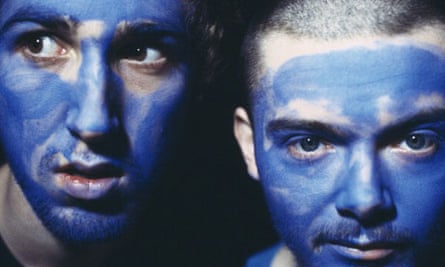
It is a grand throw of the dice for a pair of shy, stubborn Frenchmen who started out making noisy techno in their bedrooms. They could have saved themselves a great deal of time and money (they funded it themselves, only later partnering with Columbia Records) by making an album of catchy dance-pop, but they chose the hard way. If their 1997 debut, Homework, reshaped dance music and the impact of 2001's Discovery, a love letter to disco and soft-rock, is still echoing through pop now, then their hope for Random Access Memories is to inspire other artists to dream big. "It's only a state of mind to globally change," says Thomas.
Before I met Daft Punk I spoke to Giorgio Moroder, the 73-year-old producer behind such electronic milestones as Donna Summer's "I Feel Love". "I don't know very much about Guy-Man because we barely spoke, but Thomas is an incredibly intellectual guy," he told me. "He explains things in a metaphysical way. Sometimes it's a little difficult to know exactly what he means."
According to Thomas, Random Access Memories is like a movie, a painting, a fashion collection or "going on a journey in a small boat but you don't know if you're going to reach the other shore". Guy-Man, meanwhile, says precisely nothing for the first half-hour, preferring to sip his espresso, text, stare at the ceiling and generally pretend that I'm not there, his face naturally arranging itself into a weary scowl.
Thomas says that, when they were composing the score for 2010's Tron: Legacy, he wrote the "good guy" themes while Guy-Man handled the "bad guy" music. This makes a lot of sense.
Eventually, in desperation, I ask Guy-Man if he agrees with Thomas last answer. "Yes," he says witheringly. "If I disagree I will tell you." I ask him why he's stayed silent. "Silence is better," he shrugs, and Thomas laughs.
Daft Punk have never relished talking about themselves. In early interviews they came across as suspicious and aloof. "It's because you're 18 and you feel maybe guilty: why are we chosen to do these things?" says Thomas. "There's definitely reasons to feel less uncomfortable now. It's one thing to say you're going to do it and another to have done it for 20 years."
The duo met in 1987 at Paris's Lycée Carnot, prestigious alma mater of Jacques Chirac and Dominique Strauss-Kahn. "We were still children so we formed each other," says Guy-Man, finally surrendering to the interview. "There's so much that is unspoken. It's like an odd couple. Some couples will argue until they die, but some don't speak and enjoy looking at the sunset, you know?"
Thomas's father, Daniel Vangarde, produced French disco hits in the 70s – "DISCO" for Ottawan and "Cuba" for the Gibson Brothers – and Guy-Man's worked in advertising; they shared a privileged upbringing. Their first loves were Jimi Hendrix, the Velvet Underground and Phantom of the Paradise, the bizarre 1974 musical horror movie that Brian De Palma made with Paul Williams. "It covered everything we liked when we were teenagers: horror, rock, musicals, glam," says Thomas, glowing with fandom. "Listening to Led Zeppelin songs backwards, watching Texas Chainsaw Massacre on VHS and getting KISS and David Bowie albums. It synthesised all of these elements."
This article includes content provided by Spotify. We ask for your permission before anything is loaded, as they may be using cookies and other technologies. To view this content, click 'Allow and continue'.
In 1992, they formed a lo-fi rock band called Darlin' (after a Beach Boys song) with their friend Laurent Brancowitz, who now plays guitar in the successful French group Phoenix. Darlin' released just a handful of songs, which were dismissed as "daft punky thrash" by the music paper Melody Maker. Tweaking this insult into their new name, Thomas and Guy-Man switched to basic electronic equipment purchased with Thomas's 18th birthday present of £1,000, and released three singles on the Scottish dance label Soma, including the groundbreaking "Da Funk".
"Thomas did all the talking," remembers Soma founder Dave Clarke. "For the first six months I knew him Guy-Man kind of pretended he couldn't speak English. They liked being out but they weren't big drinkers. They were quite frugal. They didn't have a desire for wealth and glamour. They had a relaxed confidence that their music was going to get out there."
This was a period when the likes of the Prodigy and the Chemical Brothers were proving that dance music could transcend clubland to deliver big-selling crossover albums. When major labels came running, they were made to feel that they needed Daft Punk more than Daft Punk needed them. "Our career is defined more by the things we didn't do than by the things we did," says Thomas. "A lot of young kids come to us and say, 'What can we do to be where you guys are? We'll do anything.'
"And the answer is just the opposite. We haven't done anything that we didn't want. The only secret to being in control is to have it in the beginning. Retaining control is still hard, but obtaining control is virtually impossible."
Daft Punk's outsider mentality owed something to coming from France, whose pop music was then the butt of condescending jokes in the UK press and whose rave scene was hounded by the authorities. "Initially electronic music was anti-establishment, as punk rock and rock'n'roll were," says Thomas. "The music was shut down, the police were against the parties." He sounds like a soixante-huitard fondly remembering the barricades. "Now it's the opposite. It been totally accepted so there's nothing to fight for."
Daft Punk's 1997 debut album, Homework, recorded entirely in Thomas's bedroom, filtered house and techno through a love of classic rock. The cover displayed a logo patch sewn on to a black satin jacket, while the inner sleeve depicted a desk cluttered with adolescent artefacts, including a 1976 KISS poster and a Chic single sleeve. It was like a superhero's origin story: Peter Parker's bedroom before he became Spider-Man. Guy-Man, who designed the artwork, says that Thomas is the "hands-on technician" while he is the "filter": the man who stands back and says oui or non.
This article includes content provided by Spotify. We ask for your permission before anything is loaded, as they may be using cookies and other technologies. To view this content, click 'Allow and continue'.
The hit single "Around the World" displayed a then-unfashionable love of disco which attracted the attention of Chic guitarist Nile Rodgers. "The genius is never in the writing, it's in the rewriting," says Rodgers. "Whenever they put out records I can hear the amount of work that's gone into them – those microscopically small decisions that other people won't even think about. It's cool, but they massage it so it's not just cool – it's amazing."
For the next few years, Daft Punk could do no wrong. They commissioned striking videos from Spike Jonze, Michel Gondry and Roman Coppola. "Music Sounds Better With You", the Chaka Khan-sampling 1998 single by Thomas's side project Stardust, brought disco fever to house music. Madonna and Kylie had number-one hits that sounded uncannily like Daft Punk. In 2001 the retro-futurist Discovery revived appreciation for the kind of glossy soft-rock and sentimental 80s pop that most bands deemed too cheesy. "Homework was really to show the rock kids that techno is cool and Discovery was to show the techno kids that rock and soft-rock can be cool," says Thomas. It worked. They were sampled by Kanye West (whose forthcoming album they've worked on), celebrated as the gold standard of hipster cred in LCD Soundsystem's "Daft Punk is Playing at My House" and energetically homaged by younger artists, such as Justice.
This article includes content provided by Spotify. We ask for your permission before anything is loaded, as they may be using cookies and other technologies. To view this content, click 'Allow and continue'.
The robot helmets, which are redesigned for each new project and are famous enough to have been spoofed on The Simpsons, enhanced their mystique. "People initially thought it was just marketing," says Thomas. "It was never that. The robots in some sense were as important as the music itself." Of course, it was also great marketing and an excellent way of preserving their privacy. At last month's Coachella festival, while the crowd went wild to a short video clip of "Get Lucky", Daft Punk watched from the sidelines, blissfully unrecognised.
There was a downside to the unbroken acclaim though. The more that other people sounded like Daft Punk, the harder it become for Daft Punk to do something new. Their third album, 2005's rough, ornery Human After All, was poorly received and left Daft Punk unsure what to do next. "Usually a band 20 years into its existence doesn't put out its best records," says Thomas. "That was something we had in mind – to try to break that rule. It's not intimidating, but it takes time."
So Daft Punk stopped thinking about albums. Instead they mounted a groundbreaking world tour, their first since 1997, that did for live dance music what Pink Floyd did for stadium rock. They made an inscrutable, wordless art movie called Daft Punk's Electroma. They scored Tron: Legacy for Disney. They both started families: Thomas has a second home in LA with his actor wife Élodie Bouchez. They reluctantly agreed to be made Chevaliers of the Ordre des Arts et des Lettres, having controversially turned down the prestigious honour several years earlier, just because they didn't want to cause another fuss. "You feel like you're going to get even more attention," Thomas says with an embarrassed sigh.
In the absence of any new Daft Punk music, their back catalogue nourished America's EDM (Electronic Dance Music) explosion. Key producers, such as Skrillex, trace their love of dance music to that 2006-7 tour. "Everyone I've talked to who's seen that show counts it as one of their all-time favourites," says Ryan Dombal, senior editor of influential US music website Pitchfork. "And its uniqueness and relative scarcity makes it easy to mythologise. When a lot of artists are trying to get an audience's attention by any means necessary – Twitter, sponsorship deals, commercials, playing festivals – it's automatically appealing when an artist seems above all that."
Daft Punk, who prefer the likes of James Blake and Bon Iver to most club music, pull faces when I mention their influence on EDM. "Pthrrrrt," says Thomas. "On one hand we're flattered. On the other hand we wish people could be influenced by our approach as much as our output. It's about breaking the rules and doing something different rather than taking some arrangements we did 10 years ago that have now become a formula."
Thomas blames the machines. For a man who has spent 12 years pretending to be a robot, he takes a remarkably dim view of digital music. "Computers aren't really music instruments," he sniffs. "And the only way to listen to it is on a computer as well. Human creativity is the ultimate interface. It's much more powerful than the mouse or the touch screen."
As an antidote to those wretched machines, they recorded Random Access Memories entirely live, with dozens of musicians, in studios in Paris, New York and Los Angeles. That sounds expensive, I say. "Yes, it got expensive," Thomas nods with some pride. "But we started with just £1,000 and everything since then has been financed by the audience. It was expensive in the same way that movies are expensive, because hundreds of people work on them. We feel fortunate to be able to experiment on a large scale. There's a lot of experimentation now in alternative music, but it feels like there's no money. The people with the means to be ambitious are usually the ones who are experimenting less."
Enjoying the Hollywood analogy, Thomas says Daft Punk were the album's screenwriters and directors while the guest performers were the actors, but actors who were given licence to write their own lines. "I didn't feel like I was being brought in to add wallpaper to a house that already existed," says Paul Williams. "I felt part of the process from the very beginning."
The way individual collaborators describe their understanding of the record recalls the fable of the blind men and the elephant: each one grasped only a fraction of the whole. "They didn't tell me anything," says Moroder, who spent four hours talking about his life for the extraordinary disco history lesson "Giorgio By Moroder". "Zero. I had several dinners with the boys and I didn't even ask because I knew they wouldn't tell me."
"What I worked on was quite bare bones and everything else grew up around me," says Nile Rodgers. "They just wanted me to be free to play. That's the way we used to make records back in the day. It almost felt like we'd moved back in time."
Perhaps that's the key to Daft Punk's current mission: using their privileged position to reinvent old methods pour encourager les autres. "We're not in a golden age of audiophile excellence and craftsmanship," complains Thomas. "But there's maybe a way to put back a certain optimism. There's things that can be done with music. It's an invitation to variety."
As for where Daft Punk go from here – will they make another album? Will they ever tour again? They'd really rather not say. "The projection of the future is kind of useless," shrugs Thomas. He thinks a tour, however lucrative, would be a distraction at this point. "We want to put the spotlight on the record. That's what we are sharing with you. There's nothing else." He holds out his empty palms. "That's it."
Guy-Man points out that, after all, they have not got this far by blabbing about their plans. "We don't actively try to feed people and annoy them with what we're doing," he says, leaning back. "We are not craving to be known. If we don't have this or that we are fine. You have to be self-content. The art is the first and only priority." He reclines like a cat in the sun. "We don't have to rush things."
Random Access Memories is out on Columbia on 20 May
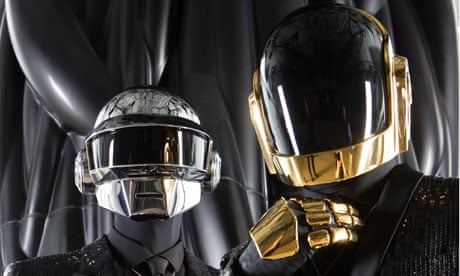



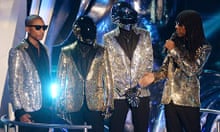
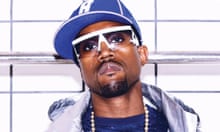



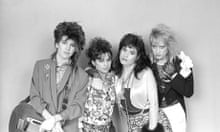
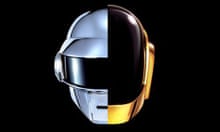
Comments (…)
Sign in or create your Guardian account to join the discussion